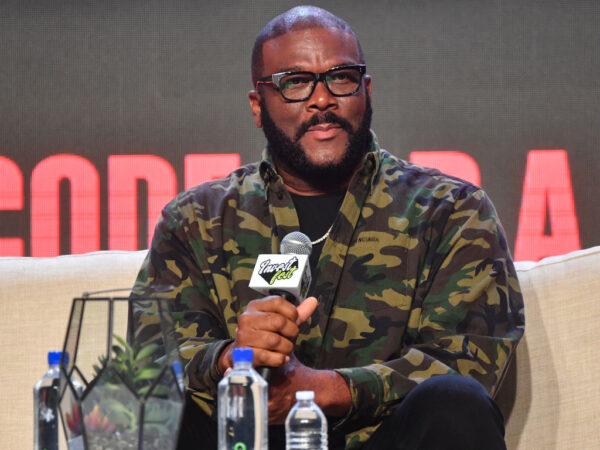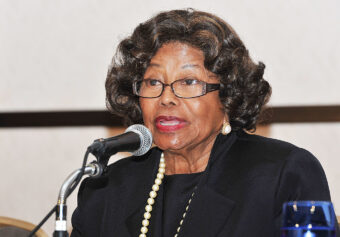Earn Your Leisure broke boundaries over the weekend, hosting the second InvestFest, a first-of-its-kind, in-person experience combining investment, entrepreneurship, pop culture, and entertainment in a festival setting, with Steve Harvey as the anchoring keynote address speaker on Aug. 6.

This year’s festival, from Friday, Aug. 5, to Sunday, Aug. 7, featured conversations with power brokers and thought leaders, sharing jewels about their journey. Highlights of the experience were three fireside chats: Eric Thomas moderated by Kenny Burns (Friday); R. Donahue Peebles, Craig Livingston, and Cheryl McKissack moderated by MG (Sunday); Dan T. Cathy moderated by David Shands (Sunday), and Tyler Perry moderated by Earn Your Leisure (Sunday).
Tyler Perry on ‘The Power of Us’
During Perry’s fireside chat, he dropped jewels about his journey from being homeless to being a billionaire in less than 30 years. One diamond he offered to the sold-out crowd, as he sat on the BET Stage, was the power of Black people and their wealth of spirit & commerce he benefited from by targeting all facets of the African American experience.
The mogul said, “I learned very early the power of us.”
“I was on tour performing 300 something performances a year, making $75-$80 million from us,” Perry continued. “There is this thing where a lot of Black people want to look down on called the chitlin’ circuit, ‘Why you doing the chitlin’ circuit?’”
The chitlin’ circuit laid the foundation for everything else.
In his 2016 keynote address at Tuskegee University, Perry spoke about moving to Atlanta to launch his first play in 1992.
“I managed to save $12,000 and I put the show up working in a used car, as a bill collector (proceeds from a tax return). I thought 1,200 people would show up that weekend but only 30 showed up. My car payment, rent, everything was tied up in it so I ended up homeless with no money and nothing to my name,” he told the 520 graduates, before sharing how it took six years before one of his plays would be successful.
“From 1992 to ’93, to ’94, I was doing one show a year,” he said. “I kept on doing the play. Every year it would fail, until 1998, the seventh year of me trying. I was about to give up and walk away.”
Perry sacrificed greatly, even becoming homeless, but believed in the content he was producing and knew that the people who it was meant for would spend their money to see themselves on the stage — later on screen, both big and small.
The filmmaker offered, “What they’re missing is the power of the Black dollar and how when the Black dollar shows up, it shows up in enormous ways.”
Didn’t Need to Ask Anybody
Perry distinguished himself as a producer and director by creating content, like his Madea franchise, for a certain aspect of Black people often neglected in entertainment. Black, lower-to-middle class, Southern and faith-centered, he abandoned popular tropes of Black life that either over glorify wealth and success or poverty and despair. He once said this was because he “speaks a language” with these people.
This intentional targeting proved to be a solid investment strategy making him a power broker at Hollywood’s most elite bargaining tables.
He goes into meetings knowing he is self-sufficient, allowing him to leverage that independence to secure the best deals for his business model.
In 2019, Perry signed a deal with Viacom for a reported $150 million per year. His deal with the media company, now called Paramount Global, reportedly runs through 2024.
The details of the deal are not public, but what has been shared is that Perry agreed to create new titles for the service (both film and television) and acquired a 25 percent equity stake in BET+, where much of the programming currently lives.
His Madea character, a staple in his film and television portfolio, has grossed for Perry more than $660 million for the content creator, according to Forbes.
Perry owns 100 percent of the work he creates, and films his projects at Tyler Perry Studios, an Atlanta property sitting on 330 acres, which has 12 sound stages and custom sets that include a to-scale White House.
Billionaire Status
In 2020, Forbes reported that Perry had reached the $1 billion net worth status. According to Forbes, Perry’s “wealth comes both from his cut as a producer and from a library dating back to the early 1990s: he owns 100% of the content he’s created.”
The Support of The Black Community
Unapologetically, he makes films and TV for the same Black people, who have supported him all along.
With the support of the community; he was able to approach being a player in Hollywood in a very different way.
“So, when I got to Hollywood, I didn’t need to ask anybody for money,” Perry boasted. “I didn’t have to ask them to give me a green light on a film. ‘Cause I had us and I still have us.”
The “Us,” according to a Nielsen study called “Seeing and Believing: Meeting Black audience demand for representation that matters,” two out of three Black viewers are more likely to watch representative content and buy from brands that advertise in representative content.
It also reported, in 2020, the Black buying power tallied in at $1.57 trillion, and the next year, its viewing power ranked at 1.06 trillion eyeballs.
With 58% of Black audiences continuing to say there still is not “enough representation of their identity group on screen,” Perry remains a hero. Not tapping into or exploiting the population for a trend, but as a trusted and valued member of the family that made it but never left.




